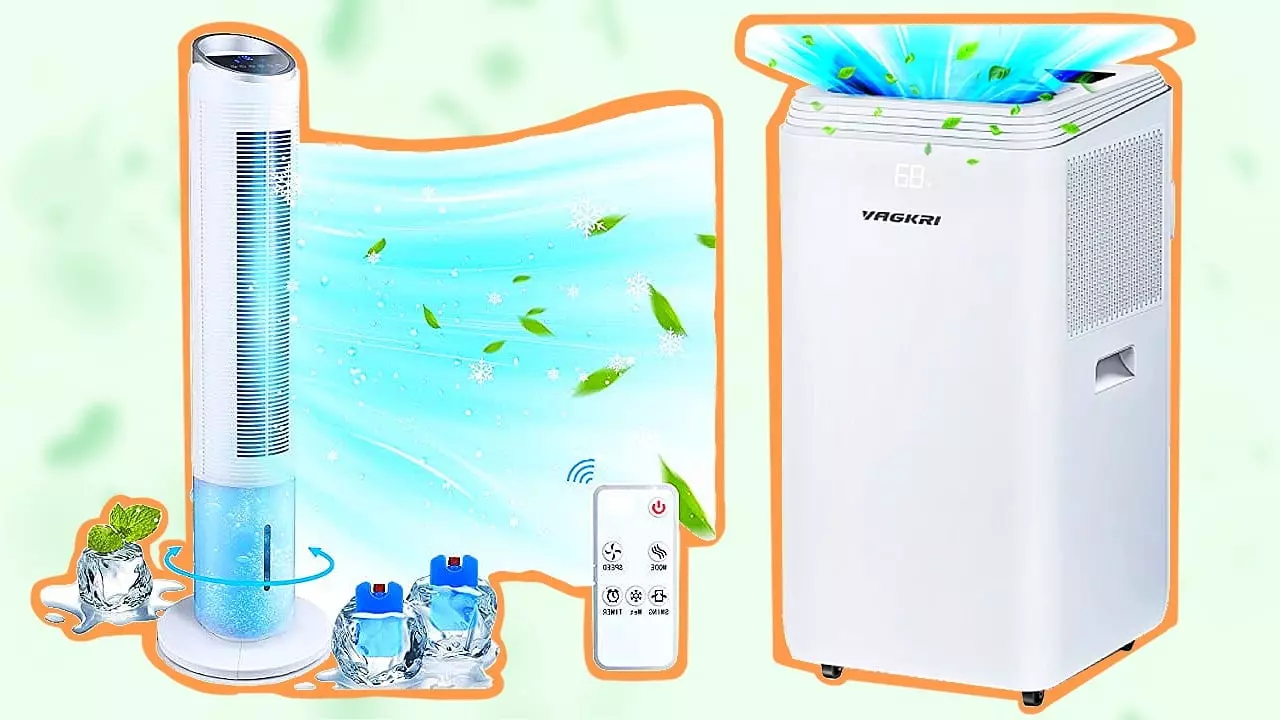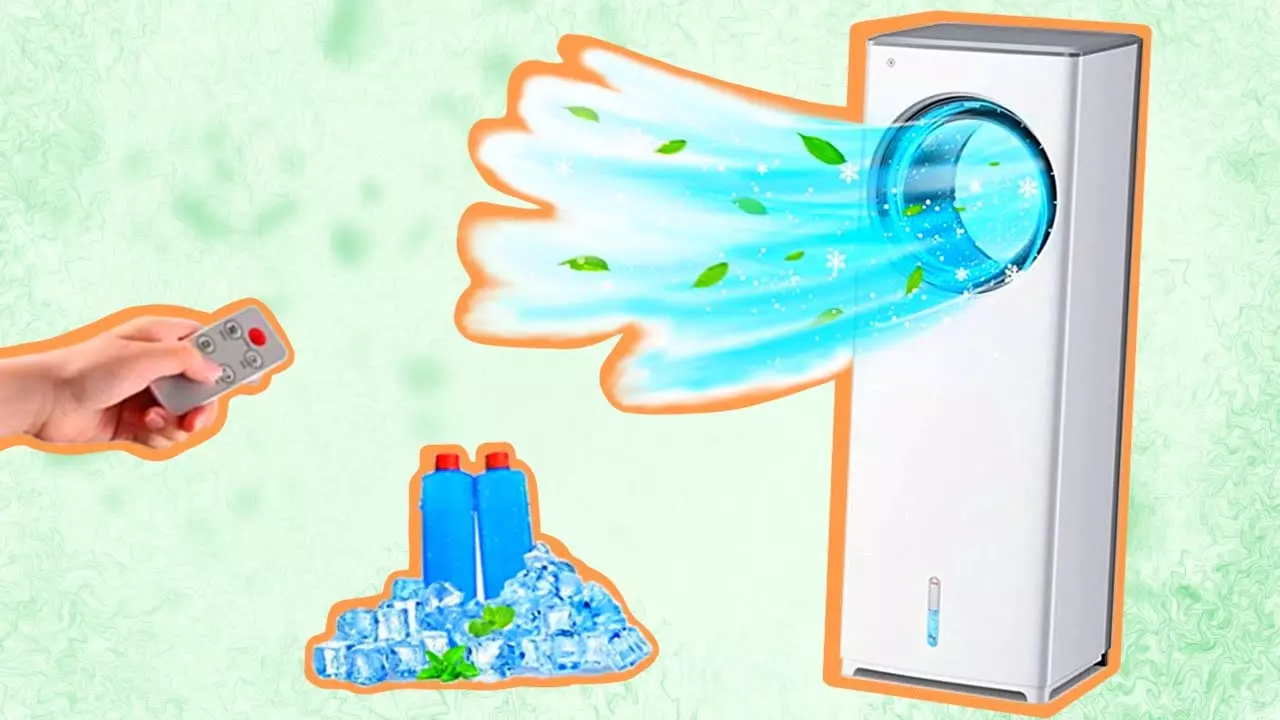Summer is here, and it's time to beat the heat with an efficient air conditioner that keeps your home cool without consuming too much energy. Tower AC units have become increasingly popular due to their energy efficiency and compact design, making them ideal for cooling large spaces, whether commercial or residential.
But how do these tower air conditioners actually work? Let's dive into the ultimate guide on how tower ACs function and why they are the perfect choice for your cooling needs.
What Is A Tower AC?
 A tower AC, also known as a floor-standing air conditioner, is a dual-hose system that comprises an indoor and outdoor exhaust hose. The indoor unit can be placed anywhere in the room, while the outdoor unit is installed outside. This design prevents overheating within your home by ejecting hot air from the outdoor unit.
A tower AC, also known as a floor-standing air conditioner, is a dual-hose system that comprises an indoor and outdoor exhaust hose. The indoor unit can be placed anywhere in the room, while the outdoor unit is installed outside. This design prevents overheating within your home by ejecting hot air from the outdoor unit.
The main advantage of a tower AC over conventional single-hose ACs or portable air conditioners is that it takes up less floor space. However, it's important to note that tower air conditioners do not have wheels, so moving them around might be a bit cumbersome as they need to be lifted.
How Tower AC Works
Tower air conditioning systems have closed loops that circulate refrigerant. This refrigerant absorbs heat as it passes through different components of the AC. When the refrigerant reaches the condenser coil located at the top of the device, hot air is released and heat transfer takes place. A fan draws fresh air from the outside environment and blows it over the condenser coils, cooling both the exterior and interior of the unit. Tower ACs also use powerful filters to ensure the indoor air is free of dust, pollen, and other harmful substances.
In addition to efficient cooling, tower air conditioners provide a regulated and pleasant temperature for any environment, be it a home or office space.
How Is A Tower Air Conditioner Different From Window ACs
Traditional air conditioners draw air into your home, cool it down using condenser coils within the system, and disperse the cooled air back into the room. Tower ACs, however, have their condenser coils located on top of the central unit, resembling a miniature tower. Warm air passes through these coils, turns cold, and cool air is blown into the room. Tower ACs also offer climate control settings for precise temperature regulation.
Are Tower ACs Better Than Traditional ACs?
Tower ACs are often chosen over traditional air conditioners for their efficiency, ease of use, and quieter operation. While some believe that traditional ACs offer superior temperature control, tower units maintain air consistency even during unpredictable weather conditions or prolonged use. Ultimately, the choice between traditional ACs, portable air conditioners, and tower ACs depends on personal preference and specific cooling needs.
If you value efficiency and a regulated temperature, tower ACs are an excellent option for your cooling requirements.
Who Can Use Tower Air Conditioners?
Tower ACs are designed for larger areas and are commonly used in businesses that require cooling for warehouses, commercial facilities, or factories. These high-powered yet energy-efficient units can cool large spaces, ensuring comfort for both residential and commercial settings. If you have medium to large-sized rooms that need consistent cooling, tower ACs are the way to go.
Power Consumption Of A Tower AC
 Tower air conditioners are known for their powerful and energy-efficient performance. Their circulatory fan blades allow them to absorb a higher volume of air and distribute it rapidly throughout the room. This rapid cooling does not compromise on efficiency and performance, making tower ACs an ideal choice for keeping your space cool during summer without skyrocketing energy bills.
Tower air conditioners are known for their powerful and energy-efficient performance. Their circulatory fan blades allow them to absorb a higher volume of air and distribute it rapidly throughout the room. This rapid cooling does not compromise on efficiency and performance, making tower ACs an ideal choice for keeping your space cool during summer without skyrocketing energy bills.
Compared to split air conditioners or portable ACs, tower ACs are designed to maximize efficiency and minimize power consumption. This makes them a cost-effective option for cooling your home throughout the summer.
Things To Consider Before Using A Tower AC
Before installing a new tower AC, there are a few important factors to consider:
1. Cooling Capacity
Determine the cooling capacity required for your room size. Tower ACs are typically suitable for larger rooms with ample space. If you have a large living room or a commercial space, a tower AC is an ideal choice.
2. Power Consumption
Energy efficiency is crucial, especially during those hot days when the AC runs for long periods of time. Tower ACs are designed to use less power, ensuring you don't have to worry about high energy bills.
3. Air Filter And Dehumidifier
Investing in a tower AC with built-in air purifiers helps filter and purify the air in your home, reducing dust and other impurities. Additionally, a dehumidifier within the AC unit helps regulate the humidity levels, ensuring a comfortable environment.
4. All Weather Options
Tower ACs are not just cooling systems; they also offer heating, ventilation, and air conditioning capabilities, making them versatile for all seasons. For those on a budget, tower ACs prove to be a cost-effective option in the long run.
5. Cost Of The Device
Tower ACs can be a significant investment, so it's essential to explore different brands and models to find the best fit for your home. Take into consideration the features and functionality offered by different brands within your budget.
6. Warranty Period
Look for a tower AC with a good warranty period, including coverage for the compressor. This ensures that you can easily claim warranty services if any issues arise.
Pros And Cons Of Tower ACs
Pros:
-
Cooling Efficiency: Tower ACs provide energy-efficient cooling for large spaces, ensuring comfort without high power consumption.
-
Easy Installation And Affordability: Tower ACs are easy to install and more affordable compared to traditional AC units, making them a cost-effective option for cooling your home.
Cons:
-
Unsuitable For Small Rooms: Tower ACs are not suitable for smaller rooms as they are designed to cool larger areas. Using a tower AC in a small room can lead to overpowering cooling.
-
Bulky And Oversized: Tower ACs are efficient but bulky, which can make moving them more challenging than portable AC units.
-
Lack Of Portability: Unlike portable AC units, not all tower ACs are designed to be easily portable. If portability is important to you, consider a lightweight portable AC unit instead.
 After a long summer day, coming home to a comfortable and cool environment is the ultimate luxury. If you're considering investing in an AC system, tower air conditioners are worth exploring. They are affordable, energy-efficient, and provide effective cooling for your home, ensuring a lower power bill and a comfortable summer.
After a long summer day, coming home to a comfortable and cool environment is the ultimate luxury. If you're considering investing in an AC system, tower air conditioners are worth exploring. They are affordable, energy-efficient, and provide effective cooling for your home, ensuring a lower power bill and a comfortable summer.
I hope this ultimate guide has cleared all your doubts about tower ACs and helps you make an informed decision. Stay cool and enjoy your summer!

















